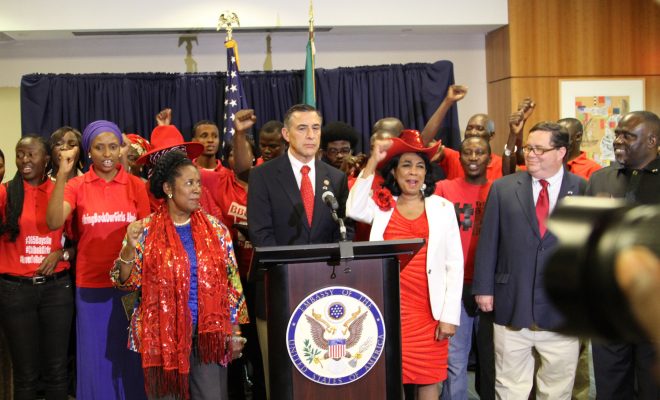 "U.S. Congressional Delegation Press Conference" courtesy of [U.S. Embassy Nigeria via Flickr]
"U.S. Congressional Delegation Press Conference" courtesy of [U.S. Embassy Nigeria via Flickr]
World
Boko Haram Releases 21 Chibok Schoolgirls in Exchange for Militant Leaders
Bringing huge relief for some Nigerian families, 21 of the Chibok schoolgirls kidnapped by Boko Haram in 2014 were released early Thursday. After negotiations between the militant Islamist group and the Nigerian government, the girls were freed in exchange for imprisoned members of the militant group.
According to the BBC, members of the International Committee of the Red Cross (ICRC) and the Swiss government helped broker the talks. Nigerian security staff and the ICRC brought some detained high-ranking Boko Haram members with them to an exchange point, where they were switched for the girls, most of whom are now mothers. The girls will be taken to the capital city, Abuja, and examined by doctors and psychologists.
1/2 Today we transferred 21 of the #Chibokgirls and handed them to the #Nigeria government authorities, acting as a neutral intermediary.
— ICRC Africa (@ICRC_Africa) October 13, 2016
But at the same time, Information Minister Lai Mohammed said at a news conference that there was no swap, and no Boko Haram leaders had been freed in exchange for the girls. “The release of these girls does not mean an end to military operations, but it is a new phase in the war against insurgency,” he said. “People want to believe bad news than good news. The girls were released, there was no swap.”
21 Nigerian schoolgirls abducted by Boko Haram released
Read More:- https://t.co/kt2512VcOs#WorldNews #Terrorist #BokoHaram pic.twitter.com/14sYVIldPc
— Baba Ramdev (@SwamiRamdevBaba) October 13, 2016
Boko Haram kidnapped more than 270 schoolgirls from a Chibok boarding school in 2014, but 57 of the girls managed to flee immediately after being taken. Only one has been freed up until now, when she was found walking in the forest in May. People urging the group to free the girls and the Nigerian government to act have tweeted using the hashtag #BringBackOurGirls, in a social media campaign supported by Michelle Obama.
But even though this is a huge step forward in the negotiations between the Islamist group and the government, Boko Haram has also kidnapped thousands more women and girls in Nigeria. Many are forced to marry the soldiers and transferred to what have been called rape camps.
It has been difficult for Nigerian security forces to discover where the group hides, or where the girls are located, due to dense forest and how spread out the fighters are. On top of all that, the northeastern part of the country, where Boko Haram’s territory is located, is suffering one of the biggest hunger crises in the world. But for now, 21 more girls are reunited with their families, and at least this is one step forward in the fight against the militants.








Comments